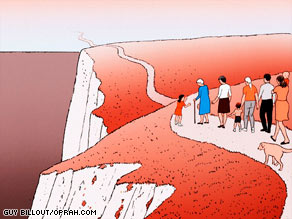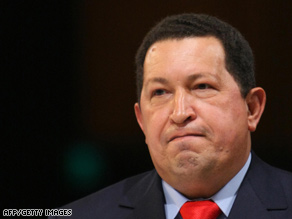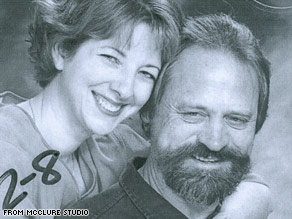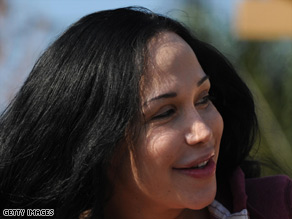 (OPRAH.com)
(OPRAH.com) -- I once attended a Navajo blessing ceremony, held in a tepee on the red sand of the Sonoran desert. The tepee was set up with great reverence, since to the Navajo, it symbolized the womb from which we all emerge, and the tent poles were "the bones of our grandmother."
The word grandparents was spoken often and lovingly throughout the ceremony. The group's silver-haired matriarch quietly reigned over the gathering, with everyone else poised to supply her needs. It was a graceful dance of mutual care, with the elderly at the center.
By contrast, our way of caring for the elderly is a clumsy, exhausting tarantella. It force-partners isolated caregivers (usually middle-aged women) with decline, disease, dementia, and death.
As one woman told me, "Having aging parents simultaneously orphaned me, saddled me with two insane strangers, and shoved every nightmare about my own future right into my face."
I heard many such stories as I researched this subject: Polly nearly bankrupted herself caring for her father, who has Alzheimer's. Brooke has barely slept since her ailing mother-in-law moved in. Jennifer had to testify against her parents in court so they'd be declared "incompetent to drive" before accidentally killing themselves or someone else. Oprah.com: The new rules of the "sandwich generation"
This is what happens when a society forgets something people like the Navajo teach explicitly -- that caring for the elderly is a "blessing path" in which the whole community should participate.
Although our culture shows no signs of collectively adopting this perspective, there are ways to regain it on a case-by-case basis. If you're one of the 34 million or so Americans who are caring for an older relative, I offer my deep respect, and the following suggestions.
Practical coping strategies
As I interviewed people who are known in demographics as "unpaid caregivers," I thought I'd hear a few logistical hints. But that turned out to be like seeking just a few general rules on "how to heal sickness" or "controlling bad emotions."
Every aging-parent scenario is unique, and there are precious few generalities that apply. One thing I can say is that you'll have fun with the responsibilities of eldercare if you enjoy running the high hurdles while juggling angry badgers. If not, you might try these techniques.
Trust your intuition about how much care is needed.
"There are hundreds of lines between being a little daffy and needing constant supervision," says Polly, describing her father's Alzheimer's. "At first my dad wasn't totally out to lunch; he was just...snacking. Then he definitely went out to lunch, then breakfast, then dinner. I've had to trust my instincts to increase care as he crossed each new line." Oprah.com: How to trust your gut
Denial is potent and seductive when it comes to dealing with aging. No one wants to acknowledge that a family member is in permanent decline.
But when your parent gets really sick, or begins, um, lunching out, you'll feel an uneasy warning from your gut. Pay attention. The sooner you acknowledge the truth -- "I must intercede" -- the sooner you can begin exploring care options. And there's a mess of exploring to do.
Prepare for a logistical wilderness.
There's no rule book to guide you through the morass of eldercare tasks and demands. Your best source of information is the Internet, where you can e-mail friends and family and research everything from buying walkers to curing constipation.
If you're a caregiver and you don't like computers, get over it. Buy a laptop -- it will cost far less than the mistakes it will help you avoid -- and make some 8-year-old teach you to cruise the Web. Everyone I interviewed, even the technophobes, told me that the Internet was a lifeline in negotiating eldercare obligations.
Online information can prepare you -- sort of -- for the pragmatic tasks you may encounter: filling out medical paperwork, hiring a care nurse, wrestling the car keys out of a beloved parent's desperate clutches.
Many of these duties will be indescribably difficult. But if instincts and information tell you to take a step, take it firmly, without second-guessing, the way you'd lead a frightened horse out of a burning barn. And don't try to manage everything alone.
Create your own village.
The Navajo and other traditional cultures understand that there's nothing more soulful than supporting people at the margins of life, those who can't walk fast or talk sense or remember how to use a toilet. They also know that this takes a village.
It really does.
Most eldercare providers in our village-less society end up jury-rigging systems of helpers. The common refrain I heard from people in the trenches? Take notes. Write down every bit of advice you get, from every person who interacts with your family member: doctors, pharmacists, neighbors, hairstylists. Write down these people's contact information. For good or evil, they're your village. Oprah.com: Do you have a hard time asking for help?
Jennifer has 45 people on her call list should her elderly parents encounter a crisis. Polly rallied support from her parents' church congregation. Not everyone in the village will help care for an elderly person, but a long list gives you multiple possibilities for support.
"No one can tell you what to expect," Anne said to me. "You have to live like a firefighter, ready to call other firefighters to solve whatever problem arises."
Psychological coping strategies
Once you've adopted this firefighting mentality about your parent's needs, you'll need a whole new set of strategies like the ones below to deal with the emotional wreckage that piles up along the way.
Surrender to the emotional grinder.
"The thing that galls me most about caring for my mother," one woman told me, "is that she's the only one who gets a morphine drip."
The emotional pain suffered by caregivers is intense -- and unlike the elderly, caregivers are expected to live through it. With every new issue your elderly relative develops, you'll head into the emotional grinder called the grief process: bargaining, anger, sadness, acceptance, repeat.
Grieving, like physical caretaking, differs from case to case. If you had a troubled relationship with an aging parent, expect to spend lots of time in the anger stage. Use this time to clean your emotional closet. Explore the anger with a therapist. Journal it. Process it with friends. Clean the wounds. Oprah.com: 4 healthy ways to grieve
On the other hand, if your declining parent was your main source of emotional support, you'll find yourself spending lots of time in sadness. You'll feel as though it's killing you. It won't.
As Naomi Shihab Nye wrote, "Before you know kindness / as the deepest thing inside, / you must know sorrow / as the other deepest thing.... / Then it is only kindness / that makes sense anymore...."
As the grieving process scrapes along, you'll learn to offer kindness to everyone: your aging relative, the people of your village, yourself. When you snap under stress and begin to rail at Nana, God, yourself, and the cat, you'll learn to be kind to yourself anyway. At that point, you'll find relief and an unexpected gift: laughter.
Nourish a sick sense of humor.
A morbid sense of humor isn't listed in any official guides to eldercare, but to the caregivers I interviewed, it is like oxygen.
Take, for example, Meg Federico's memoir "Welcome to the Departure Lounge." Federico's wry portrayal of her mother's senescence is both sad and hilarious. Without belittling her mother or her stepfather, Walter, both of whom suffered dementia, Federico recounts conversations like this one:
"I can't seem to find my keys," Walter told Mom. "Say, do you have them?"
"Oh, don't worry about keys, dearest. We don't need them. We can jump out the window and fly home."
"What?" said Walter. "You can fly? I never knew."
"So can you, but you have to take your shoes off."
To Walter's credit, he was not convinced.
Just acknowledging that this is funny makes it tolerable. Cracking up can keep caregivers from, well, cracking up.
"Bill and I are training his dad to 'go toward the light,'" said my friend Anne, whose father-in-law no longer recognizes his family. "Any light we see -- lamps, flashlights, the TV -- we steer him over there. We figure he can use the practice."
Of course, Anne isn't serious. Not being serious is how she and Bill are surviving. If you can't train your elder to go toward the light, you can make light of the situation. And sometimes, that light becomes splendiferous.
Ponder the nature of existence.
There's nothing like caring for the elderly to help you face your own mortality. Many caregivers told me that their experience was dissolving, through simple drudgery, their fear of death.
Pulitzer Prize--winning psychologist Ernest Becker wrote that the denial of death underlies all evils, and that we must drop this denial to live fully. The caregivers I interviewed would agree.
"Fear of death was my biggest obstacle in life," said Polly. "To help my dad, I have to get past it. He's showing me how to die, which is really helping me live."
Other caregivers went further. They said that as they watched the door close on their loved one's physical identity, a door to the metaphysical slowly opened.
"I don't believe in an afterlife, but as my mother died, I truly understood that being dead is no more frightening than being asleep, which I love."
"As my husband's body was failing, he became almost translucent. I went right through my own pain and felt the most intense peace. I can still find that."
"Just before my grandmother died in surgery, I heard her voice saying, 'I'm leaving now, but you'll be fine.' I've been less anxious about everything ever since."
This is why traditional cultures value even the most fragile, disoriented elder, why the Navajo carry "Grandmother's bones" with such reverent attention. Even as you grapple with the logistical and psychological stress of eldercare, there will be moments when you find yourself on the "blessing path."
Rather than a long day's journey into night, you'll feel yourself making a long night's journey into day: through fear and confusion to courage and wisdom. Receive this gift, the final one your parents can offer before they take off their shoes, jump out the window, and fly home.
By Martha Beck from O, The Oprah Magazine © 2009 Venezuela temporarily seized a pasta-making plant Friday belonging to U.S.-based food giant Cargill, citing a production quota dispute.
Venezuela temporarily seized a pasta-making plant Friday belonging to U.S.-based food giant Cargill, citing a production quota dispute.


